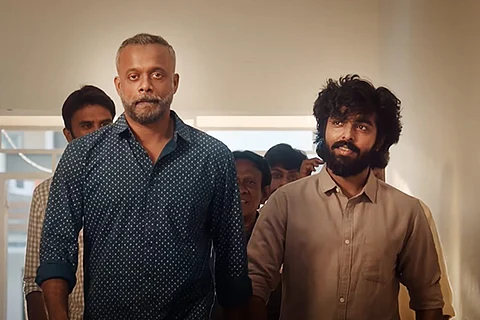

What is the human cost of a scam plaguing our educational institutions – the selling off of seats to desperate students and parents? Selfie by debutant director Mathi Maran is an attempt to tell this story and tell it with heart. GV Prakash (GVP as he’s popularly known) leads the film as Kanal, one of the countless youngsters in real life forced into an engineering course due to family pressure rather than personal enthusiasm. While his passions lie elsewhere, a disinterested Kanal is strong-armed into joining engineering and discovers quickly to his chagrin that his father (Vaigai Chandrashekar) has landed the family in debt to pay for the seat.
Instead of giving GVP a self-righteous path in the story from here onwards, he’s drawn into the very same murky world that scammed his father. Almost as if to ask, what is a youngster who hoped to use his quick-thinking talents towards starting a business to do when his life’s most important decision at that age is made for him “because parents know best”.
GVP delivers the role with enough depth to get you invested in the problems that come his way after becoming involved in a world of cut-throat-scamsters and gang leaders. His angry young man persona trying to make his mark in this fiercely competitive world leads him to clash with Gautham Vasudev Menon’s (GVM) Ravi Verma. Interestingly, GVM’s controlled rage, a degree of inscrutability and unsettling calm even in the most heated sequences plays off sharply against Kanal’s extreme emotional swings. Neither are particularly evil nor essentially good people. It’s possible to imagine that if Kanal ultimately made a different set of choices, he’d be not too different from Ravi Verma as he reaches the same age. They do seem to have a lot more in common than either character would like to admit. Both are willing to go to any lengths to hold on to the place they have schemed their way to, both have people they care for and people they are willing to burn to move up the ladder. It’s certainly refreshing to have a mainstream Tamil film that veers towards characters fueled by darkness rather than plastic distinctions of good versus bad which the formula demands.
What, unfortunately, lets down actors and the story though is a severe pacing problem. There are sequences, particularly the one leading up to the intermission, that keep you on the edge of your seat and then there are those so meanderingly complex, you struggle to grasp what on earth is happening. Or some so overly dramatic that you’re groaning internally. Only to be finally stuck with a third act that is so hasty and convenient it feels like the director remembered at the last minute that he had to set up a scene for the traditional “message moment” common at the end of most Kollywood films.
Audiences caught in the web of increasingly complicated offensives and counter-offensives as the events in the story escalate are left wondering at the film’s internal logic, given how much it veers from compelling to just plain confusing. Thrown into this uneven mix are fight scenes that seem to be trying to do something thrilling. What that is you can’t really tell since they are almost all badly choreographed.
Lost in this pacing and formula issue is also the heroine, played by Varsha Bollamma. She is so inconsequential to the story I hardly registered her character’s name. Varsha does her best in the few scenes she’s in, none of which are integral to the story. She simply serves to tick off the Tamil movie checklist of having a heroine. Barely. Another character who had me conflicted was Kanal’s best friend, Nazeer. The story takes care to ensure his Muslim identity registers with us, though you’re left wondering why exactly? He is volatile, tragic and – spoiler alert – doomed to die so that his life can be the reason for Kanal to hold on to his own humanity. It’s truly depressing that most of the few Muslim characters Tamil cinema gives us almost always die or fade into the background for the hero’s benefit.
The film is also populated with recognisable faces like Sangli Murugan, in a sadly two-dimensional role, and Thangadurai, whom we memorably last saw as the witty boxing-ring commentator in Sarpatta Parambarai.
On the whole Selfie is a laudable first attempt by Mathi Maran, who has previously been associated with director Vetrimaaran. A more tightly edited screenplay and less sudden compulsions for over-the-top theatricality would have given us a far better story on a problem that urgently requires addressing in the real world. The film released across theatres on April 1.
Disclaimer: This review was not paid for or commissioned by anyone associated with the film. Neither TNM nor any of its reviewers have any sort of business relationship with the film's producers or any other members of its cast and crew.